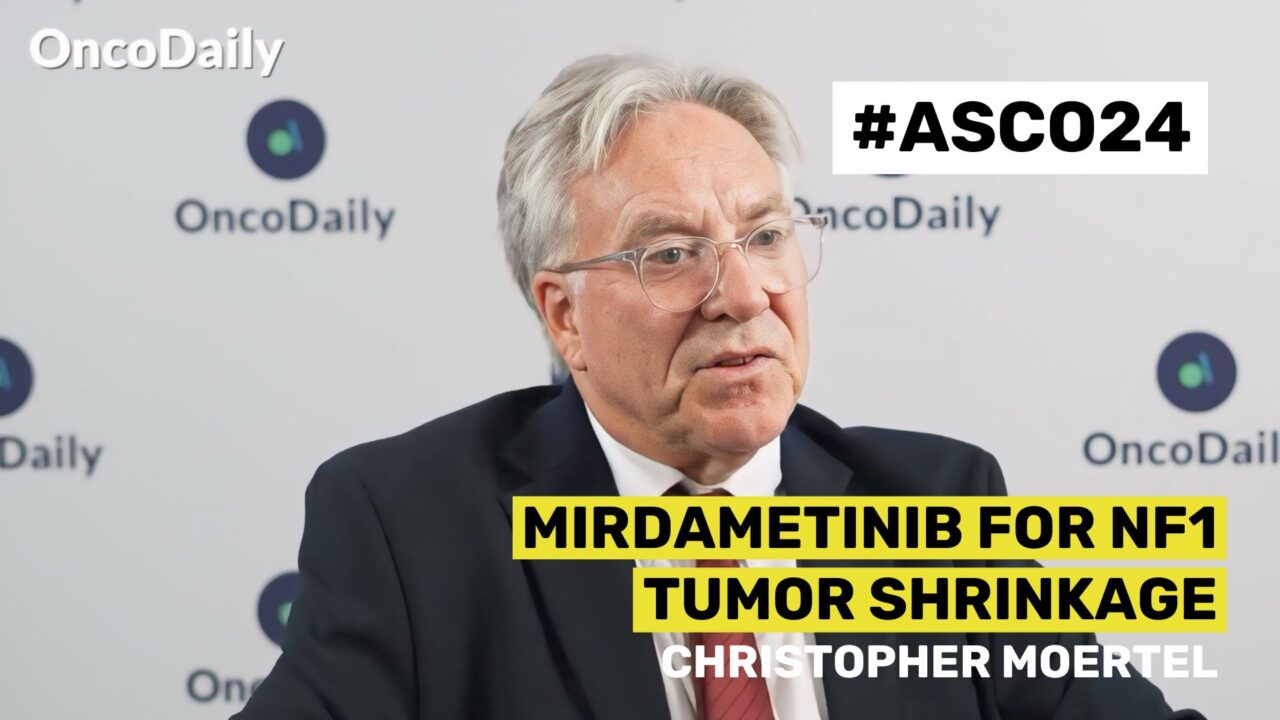
ASCO2024 Updates: Dr. Christopher Moertel on Mirdametinib for NF1 Tumor Shrinkage
The American Society of Clinical Oncology (ASCO) Annual Meeting is one of the largest and most prestigious conferences in the field of oncology. This year, the meeting took place from May 31 to June 4 in Chicago, Illinois. The event gathers oncologists, researchers, and healthcare professionals from around the world to discuss the latest advancements in cancer research, treatment, and patient care. Keynote sessions, research presentations, and panel discussions are typically part of the agenda, providing attendees with valuable insights into emerging trends and innovations in oncology.
This year, OncoDaily was at ASCO 2024 for the first time covering the meeting on-site. We had the pleasure of interviewing researchers who summarized the highlights of their work.
In this video, Dr. Christopher Moertel, professor of pediatrics at the University of Minnesota, shared insights on ‘ReNeu: A pivotal phase 2b trial of mirdametinib in children and adults with neurofibromatosis type 1 (NF1)-associated symptomatic inoperable plexiform neurofibroma (PN).‘
Hi, I’m Dr. Christopher Moertel. I’m a professor of pediatrics at the University of Minnesota, and I lead our neurofibromatosis clinic. During my years at the University of Minnesota, I’ve concentrated on developing new therapies for patients with NF1.
One of the main problems that people with NF1 have is a tumor called plexiform neurofibroma. We work hard to develop new therapies for plexiform neurofibroma, and I engaged with SpringWorks several years ago to develop this new therapy and to help them with a clinical trial for a new drug called Mirdametinib. Mirdametinib is a selective MEK1-2 inhibitor.
It’s investigational, it’s highly CNS penetrant, and it can be taken orally, either as a tablet or as a dispersible formulation. So people who have difficulty swallowing, it’s easy for them to take the drug. Plexiform neurofibroma can manifest itself in early childhood or adulthood, and the main symptom we see among our patients is pain.
Pain happens in well over 50% of patients and was the main complaint in patients enrolled on our clinical trial. Plexiform neurofibroma can also cause functional difficulties, especially if it affects the extremities. It can affect quality of life, and it can also be disfiguring.
As a matter of fact, 50% of the patients on our clinical trial had head or neck involvement, significant disfigurement, and so our hope with the trial is that we would help those things, the pain, the quality of life, and the disfigurement, so that people can have a better life overall. We enrolled patients on two cohorts. One cohort was the pediatric cohort, patients up to age 18, and then patients over 18 were enrolled on the adult cohort.
Our oldest patient at the time of enrollment was 69 years of age, and we were very happy with our outcomes overall. Our main outcome measure was confirmed objective response, and about 50% of patients on the two cohorts had achieved that objective response. Objective response was defined as a greater than 20% shrinkage in the tumor.
We had several patients have very deep responses, that is, greater than 50% response, and at least one patient in each cohort had a 90% response, so we were very happy about that. When looking at the toxicity of our medicine, it mirrored pretty closely toxicity that’s been seen with other MEK inhibitors, and we were surprised, though, that our overall toxicity rate was actually a little bit less, and many previously noted toxicities were milder in our patient group.
We did have one patient have significant toxicity, and in that patient, she had what’s called a retinal vein occlusion, but whether it was due to our drug or not was confounded by the fact that she had recently started on hormonal contraception and had had two COVID-19 vaccines in the month prior to the event.
Nevertheless, she came off study and has continued to improve since that time. Patients really were able to adhere to the regimen that we prescribed, and even though there was some toxicity, they were, in general, able to stay on study with few interruptions. So overall, we achieved our goals.
We showed that the drug was well-tolerated, that it really had a significant effect on the tumors we were trying to treat, and I believe that this drug has the potential to be a significant contribution to the NF community and to help them achieve their goals of living a good, high quality of life with little pain and little disfigurement.
More videos and content from ASCO 2024 on OncoDaily.
-
Challenging the Status Quo in Colorectal Cancer 2024
December 6-8, 2024
-
ESMO 2024 Congress
September 13-17, 2024
-
ASCO Annual Meeting
May 30 - June 4, 2024
-
Yvonne Award 2024
May 31, 2024
-
OncoThon 2024, Online
Feb. 15, 2024
-
Global Summit on War & Cancer 2023, Online
Dec. 14-16, 2023
